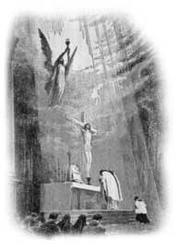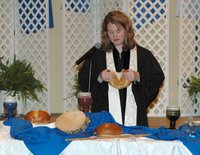Joshua 24:1-2a, 14-18Psalm 34:15-22Ephesians 6:10-20John 6:56-69I don't know about you, but I'm a bit worn out with the 6th chapter of John. My sermon this Sunday is on the text from Ephesians and so I have selected a passage from John that is congruent with the passage from Ephesians. (especially verse 19)Alternate Gospel Passage:
John 3:11-21Will You Be Able to Stand
Against the Wiles of the Devil?
In Ephesians, Paul speaks to the Church using beautiful poetic language that probably came from hymns sung by the early Church. He speaks of the Church as God's creation of a unique community with the crucified Christ as its head. He speaks of reconciliation to God through the death of Christ as breaking through the power of evil. He speaks to both Jews and Gentiles. He talks about his own calling and his apostleship which includes his mission to the Gentiles and his stewardshp of the mystery of the Gospel. He stresses unity in the Church. To Paul, love for our brothers and sisters is an imitation of God's love for us.
After five and a half chapters, he begins his concluding remarks with the word, "Finally...", as though to say "After all of this instruction here is the summation of all that I have said." The "Finally" that Paul sees as the culmination of all of his teaching is to "be strong in the Lord and in the strength of his power." At the end of verse 13 carrying into the beginning of verse 14, Paul says "and having done everything to stand firm, STAND FIRM!"
Easy to say, hard to do. But Paul knows that and he provides us with advice on how to "Stand Firm."

What he tells us, though is another one of his metaphors. "Put on the whole armor of God, so that you may be able to stand against the wiles of the Devil." There are a lot of issues here that need to be explained. And I suppose one reader's explanation is as valid as another's, so here is my take on what Paul is saying:
The words or phrases that have to be examined more closely are armor of God, Devil and wiles.
Meriam Webster defines wile as "a trick or stratagem intended to ensnare or deceive."
The Battle of Missionary Ridge in Chattanooga, Tennessee during the War Between the State (or the Civil War) is a battle that many historians agree was the battle that began to turn the war in the favor of the Union side. Up until this battle the South held the upper hand.
Because of the geography of the South, Chattanooga lies in an extremely advantageous place. It lies on the northern shore of the Tennessee River, between the Appalachian mountains on the East and the Cumberland Mountains on the West. The Southernmost ridge of the Cumberlands is Lookout Mountain across the river from Chattanooga. Missionary Ridge is a steep ridge that runs east from the foot of Lookout mountain across the south shore of the Tennessee River.
The Confederates had a strong fortification on top of both Lookout Mountain and Missionary Ridge. The Union Army was stalled at Chattanooga and could not advance southward because of the combination of topography and the Confederate fortifications. The battle of Missionary Ridge and the retreat of the Confederate army units stationed there allowed General Sherman to advance over the ridge and begin his "March to the Sea" campaign that split the South in two, disrupting its ability to resupply it troops.
Now you may remember Lewis Grizzard, the comedian. And you may ask "what does he have to do with Wiles of the Devil and/or the battle of Missionary Ridge?" Well, in his day, Lewis told a little known story about how the "Yankees" won the day at Missionary Ridge.
You see, General Sherman sent a scouting party of six men up the ridge to spy on the Confederates and bring back vital information that would inform his strategy. They did not return. Puzzled at the loss of his men, he hand picked a group of thirty men to go and rescue the first six. He waited several days but they too did not return. Finally, General Sherman sent 100 of his best fighting men up the ridge to find out what had happened. This time, one lone soldier returned and fell dying at the tent of the great general. In his dying words he gave the general all he needed to succeed in the battle, "General Sherman, Sir, it's a trick! There's two of them."
So much for tricks.
I have said in the past that I don't believe in the Devil. I think I need to clarify that statement.
If by "Devil" we are talking about a supernatural being, a personality that is characterized as the god of evil as opposed to God who is then characterized as the god of good, then NO, I don't believe in the Devil. Remember Flip Wilson's character, Geraldine? Whenever some impropriety was discovered she would cry out, "The Devil made me do it!"
I believe that there is only one God and he is the creator of everything in this universe, both good and evil.
But if we are talking about the presence of evil in the hearts of men and women and how that evil strain can be compounded by people who band together and achieve positions of power through evil means to further their eivil causes, then the personification of the affects of these people can certainly be called the Devil.
I think that this description of the devil can help us in understanding what Paul said to the Ephesians and, in turn, what we should understand in the passage we read this morning.
But what about evil? We all know that evil exists. We also may think we have experienced evil or, at least, the affects of evil acts. But what exactly do we mean by evil?
Again we will turn to Meriam-Webster who defines evil as "morally reprehensible: SINFUL, WICKED, e.g. an evil impulse;"
Not much help here.
Perhaps we could think of evil as the motivation behind the breaking of one of the commandments of God. You know, thou shalt not kill, thou shalt not steal, thou shalt not bear false witness, thou shalt not covet, etc.
But here we get bogged down when we look at an example. Take, for instance, a non-political family in Lebanon whose house is destroyed by Israeli jets while on a bombing mission against a Hezbolah stronghold. To the family whose house was destroyed there was evil involved in the destruction of their home. Where is the evil? Is it in the heart of the young Israeli pilot who dropped the bombs? You might say "No, he's just as innocent as the victims, for he was drafted into the airforce and was ordered by his superiors to fly that mission."
What about the Hezbolah soldier, manning the stronghold being attached? Perhaps there is the evil? Well, maybe, but just maybe it was the killing of a loved one in some earlier battle with Israel that caused him to seek retribution.
What about the leaders of both sides? Their causes are good and noble, they want peace and autonomy for their people. But don't they also want power and doesn't power mean power over? Are their motives noble or evil?
OK, this is a gross over simplification. But where is the evil here? It depends on your point of view doesn't it? Sympathasizers of one side will always see the evil in the other side but almost never in their own. But it's there. Where?
Jesus said, the 'Kingdom of God is in you." Well, friends, I'm afraid that the only place for evil to reside in this world is inside us too. "Morally reprehensible as in sinful or wicked." Or perhaps it's the motivation in our heart to break one of God's commandments.
What about "Love thy neighbor as thyself?" Aren't we always making choices based on selfish motives rather than selfless ones? Remember Cain and Abel? Cain was jealous because Abel received God's blessing and he didn't. Selfish!
The business man buys up all the assets of a family owned company and fires everyone, because he believes he can turn a profit using different management and workmen. Self centeredness? What about greed? Wanting more than you have to the point of wanting what someone else has is called covetousness.
What about in your marriage, when you always want everything your way? Or children when they want to do something their parents don't allow? Selfishness, Greediness, Covetousness. All are sources of evil. But they are all personal and all evil is, in the end, highly personal.
But Paul tells us that in order to be strong and resist the tricks our selfish and evil natures play on us we must put on the armor of God.
Paul wrote this letter from prison in Rome. Every day he watched the Roman Soldier who was his jailer dress for the day. He must have thought about this armor the solder wore and he realized that it's purpose was to protect the soldier against the weapons of the enemy. For Paul, evil was personified in the form of the Devil, and the Devil was the enemy. We might say that the Devil is in us. So we need to put on this armor to protect ourselves against this enemy.
Paul gives us a laundry list of this armor:
The belt of Truth. The belt was the foundation which held all of the other pieces of the soldier's armor. Truth should be the foundation of our every action, our every thought.
The breastplate of Righteousness. Most people think Self-Righteousness when they hear this word. It simply means doing the right thing.
The shoes that make us ready to proclaim the gospel of peace. What makes us ready to proclam the gospel of peace? Prayer, Love, putting others first.
The shield of Faith. Faith in God defends us against all of the flaming arrows thrown at us by our opponents.
The helmet of salvation.
and
The sword of the spirit, which is the word of God.
So how do we stand firm against the evil in our own hearts? We do so by trusting in God.
Proverbs 3:5-7
KJVTrust in the LORD with all thine heart; and lean not unto thine own understanding. In all thy ways acknowledge him, and he shall direct thy paths. Be not wise in thine own eyes: fear the LORD, and depart from evil.
Thanks be to God.






